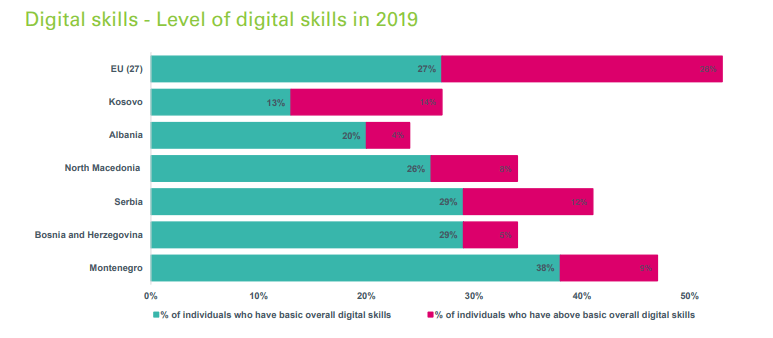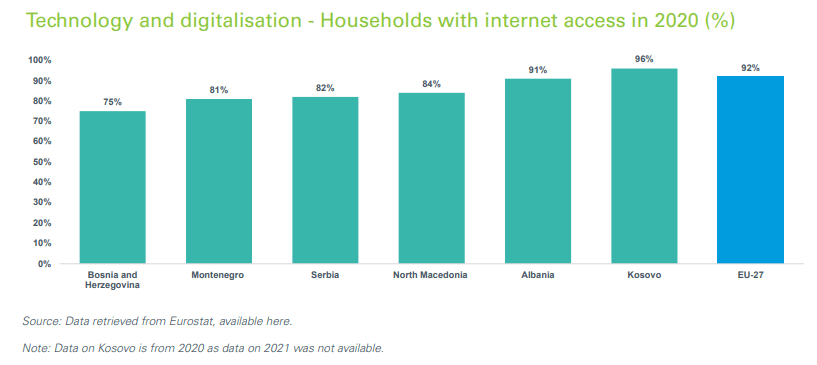The rapid evolution of Balkans in Tech Sector
When you hear the word ‘Balkans’, what is the first thing that comes to your mind? War and destruction? Things are changing in the Balkans region fast. This troubled region has a long history of conflicts and wars, which belongs to the past. Today, it houses some of the fastest-growing economies in the world. In fact, some analysts call it “the new Europe” because of its unique combination of Eastern and Western cultures. It has also become one of Europe’s most innovative regions!
It is a well-known fact that the Balkans have suffered from many different political conflicts, disruptions and wars. Therefore it has taken years of effort from political regulations and work to get things back on track. Luckily a new era of change has captured the whole Balkans, as it seems that with the rapid evolution of digitalization all over the world, the need to advance in this sector is enormous. Therefore, the Balkans countries, for the past years, have started a new form of “movement” where they have invested in the growth of the IT market and technology sector.
The progress is evident, but still quite far from the rest of the high-tech evolved countries. According to a study analysis done by the European Union Institute for Security Studies ISS (Predictions for the Balkans in 2025) with subjects of study, countries such as Albania, Kosovo, Montenegro, Serbia and Macedonia, this tech growth was stated as a possible scenario for the development of the Balkans in 2025. The report notes that one of the blocking issues these countries are facing towards faster growth in this direction is the fear of ‘the ghost of the past’. This phenomenon is connected with all the issues that the Balkan has faced throughout the years and has resulted in a behaviour mentality stopping these new tech movements from developing further.
“At the moment, the gap in digital transformation seems the easiest one to bridge. If properly supported and managed, digital transformation in the Western Balkans can help achieve higher growth and greater levels of employment. Furthermore, from a political standpoint, it can have a positive impact on administrative procedures, reducing the space for corruption, increasing regional connectivity, and clearly making citizens’ lives easier. However, if the gap is not closed and the process is mismanaged, the region risks yet again being left behind.” – as stated in the Challeiot Papers by ISS.
Digital literacy is reduced while digitalization overflows the Balkans
The process of digitalization has been a challenge not only for businesses but for different institutions as well. The need to implement the technology in everyday operations has grown, and the need to have the skills and conditions to run everyday processes efficiently is quite significant. To adapt to these changes, the Balkans have adapted rather quickly to catch up with the rest of the world. Internet access and digital skills are prerequisites to integrating into the digital economy with its new technological advancements.
Overall, the targeted Western Balkan countries have a high internet penetration; a high percentage of households have access to the internet. The majority of the targeted Western Balkan countries have incurred an increase in internet penetration from 2019 to 2020.


Source: Data from Eurostat, reported in ‘Embracing the digital age’ report by ETF
On the other hand, the development of the IT markets on a national level, as well as the level of digitalization of the countries, can be assessed using the Networked Readiness Index (NRI), one of the key indicators for the evaluation of economies’ digital development, i.e. the capacity of countries to leverage the ICT for competitiveness and wellbeing. According to the ETF report 2022, it is stated that on average, 20% of individuals in the region possessed above-average digital skills compared to 25% in the EU in 2019.

New things coming from the “new Europe” countries
The high numbers represented by the statistic of internet usage and the growth of the NRI percentage created the opportunity for the Balkans to build bridges between the different ethnic communities in the region and attract investors this way. Today, goods, services, investments and workers circulate freely in the area, which has a higher market potential, attracts vital foreign direct investment (FDI) and boasts more intra-regional trade. Also, during 2020-2021, the COVID-19 pandemic produced a surge in startups and tech activity in these countries.
A regional IT network, BalkanizeIT, has been established to develop regional technology and launch a startup scene for the region. Twenty-three hubs are now operating, bringing the tech revolution and IT education to every corner of the Western Balkans, not just big urban centres. Different IT businesses are developing products for a worldwide market in collaboration with ‘BalkanizeIT.’ Over 400,000 people have participated in various programs, workshops, and lectures organized by IT experts. ‘BalkanizeIT’ has also assisted in reforming and modernizing the educational system by introducing digital tools and resources in schools. It has trained workers in key sectors such as software engineering, front- and back-end design, and data science throughout the region.
Therefore, conflicts which previously occurred regularly are now a thing of the past. And the next years will be crucial for the European future of the Western Balkans, as it is expected to witness more technological growth and innovations from these countries.



